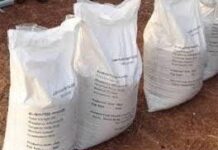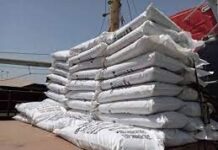 people of the rural area in terms of the facilities and services rendered to them.
As we commemorate our sovereignty, this column will feature the real conditions of the rural people to show how they fared after 45 years, minus the 2 years of the AFPRC Transitional period, living in a sovereign republic.
It is essential to remind the readers that Gambia attained sovereign status in April 1970.
In part one, it was indicated that a country’s growth and development is fuelled by various components in its economy and ultimately, sustainable growth and development depends on the strengths and capabilities of a country’s human resources.
As at October, 2014 the total population of the Gambia was 1,882,450 million people while the annual population growth rate is estimated at 3.2 %( source: 2013 census of the Gambia Bureau of Statistics).
About 50 per cent of the population now lives in urban areas compared to 37 percent a decade ago (2004).
We showed in part one that a population movement from rural to urban areas has resulted in about 55 per cent of the population currently living in Banjul, Kanifing and the Brikama Local Government Areas and promised to show in this edition why population movement from rural to urban areas.
To begin, it is essential to stated that the most vulnerable groups in the rural area of The Gambia are women.
The majority of these women continue to play a subservient role and despite being the most vulnerable, they contribute to the well-being of their families and the development of rural economies.
They work on the land for family survival with little security and yet ownership of land is concentrated in the hands of male family members.
The working conditions are tough for these women. They spend several hours walking to the field and by the time they get to the farms, they are exhausted. They grow crops for their families, some of which they sell locally to pay school fees, purchase school uniforms and nappies for their babies.
It is worse if a woman is divorced and chased away from her husband’s land.
In most cases, their own families do not want to see them or lodge them.
Their families and friends coaxed them to return and make their marriage work.
Women risk their health in order to put bread on the table. They work under the burning sun without sunscreen working on the farm, garden, processing food, fetching water or doing laundry.
Maram Ceesay, a woman in her 50s in Kerr Biran village, informed this reporter that they grow up, live and die in drudgery due to the lack of labour saving devices in agricultural and food related production in the Gambia.
According to her, they woke up when the cocks crow and start their daily drudgery with the fetching of water by using hand pump or pulling 20 litre containers from wells as deep as 35metres as in the case of Kerr Biran, preparation of breakfast by either pounding cereal or travelling to Porokhane in the sister Republic of Senegal to enjoy labour saving devices facility, which impact negatively on their health.
With no employment opportunities in the Rural Gambia other than the farm, poverty is taking a dramatic toll.
Food scarcity as a result of poverty in the Niamina East District warranted the adoption of numerous strategies to make ends meet at the level of the family. Women have resorted to collecting ‘Goweh’ that they sell to buy food. Only few women used to engage in this activity before but because of the drought and crop failure this year, almost all the women are involved.
Yama Jallow of Niamina East said “we cross the river everyday to dig out the roots of the goweh grass with small hoes and we spent hours as we strived to get 3-4 cups that earned us D80.Tis tedious but we have to do it every day to get money to buy food for the family.”
Women risk their health in order to put bread on the table. They work under the burning sun without sunscreen working on the farm, garden, processing food, fetching water or doing laundry.
According to the women, the combination of the preparation of meals with farm work, laundry, fetching water in the absent of labour saving devices makes women empowerment a lip service in rural Gambia.
See Part Three for more on the Conditions of Rural People.
]]>
people of the rural area in terms of the facilities and services rendered to them.
As we commemorate our sovereignty, this column will feature the real conditions of the rural people to show how they fared after 45 years, minus the 2 years of the AFPRC Transitional period, living in a sovereign republic.
It is essential to remind the readers that Gambia attained sovereign status in April 1970.
In part one, it was indicated that a country’s growth and development is fuelled by various components in its economy and ultimately, sustainable growth and development depends on the strengths and capabilities of a country’s human resources.
As at October, 2014 the total population of the Gambia was 1,882,450 million people while the annual population growth rate is estimated at 3.2 %( source: 2013 census of the Gambia Bureau of Statistics).
About 50 per cent of the population now lives in urban areas compared to 37 percent a decade ago (2004).
We showed in part one that a population movement from rural to urban areas has resulted in about 55 per cent of the population currently living in Banjul, Kanifing and the Brikama Local Government Areas and promised to show in this edition why population movement from rural to urban areas.
To begin, it is essential to stated that the most vulnerable groups in the rural area of The Gambia are women.
The majority of these women continue to play a subservient role and despite being the most vulnerable, they contribute to the well-being of their families and the development of rural economies.
They work on the land for family survival with little security and yet ownership of land is concentrated in the hands of male family members.
The working conditions are tough for these women. They spend several hours walking to the field and by the time they get to the farms, they are exhausted. They grow crops for their families, some of which they sell locally to pay school fees, purchase school uniforms and nappies for their babies.
It is worse if a woman is divorced and chased away from her husband’s land.
In most cases, their own families do not want to see them or lodge them.
Their families and friends coaxed them to return and make their marriage work.
Women risk their health in order to put bread on the table. They work under the burning sun without sunscreen working on the farm, garden, processing food, fetching water or doing laundry.
Maram Ceesay, a woman in her 50s in Kerr Biran village, informed this reporter that they grow up, live and die in drudgery due to the lack of labour saving devices in agricultural and food related production in the Gambia.
According to her, they woke up when the cocks crow and start their daily drudgery with the fetching of water by using hand pump or pulling 20 litre containers from wells as deep as 35metres as in the case of Kerr Biran, preparation of breakfast by either pounding cereal or travelling to Porokhane in the sister Republic of Senegal to enjoy labour saving devices facility, which impact negatively on their health.
With no employment opportunities in the Rural Gambia other than the farm, poverty is taking a dramatic toll.
Food scarcity as a result of poverty in the Niamina East District warranted the adoption of numerous strategies to make ends meet at the level of the family. Women have resorted to collecting ‘Goweh’ that they sell to buy food. Only few women used to engage in this activity before but because of the drought and crop failure this year, almost all the women are involved.
Yama Jallow of Niamina East said “we cross the river everyday to dig out the roots of the goweh grass with small hoes and we spent hours as we strived to get 3-4 cups that earned us D80.Tis tedious but we have to do it every day to get money to buy food for the family.”
Women risk their health in order to put bread on the table. They work under the burning sun without sunscreen working on the farm, garden, processing food, fetching water or doing laundry.
According to the women, the combination of the preparation of meals with farm work, laundry, fetching water in the absent of labour saving devices makes women empowerment a lip service in rural Gambia.
See Part Three for more on the Conditions of Rural People.
]]>




















